
- Liposomal Delivery
- Green Tea Study
- Fisetin Study
- Berberine Study
- Glutathione Study
- More Research



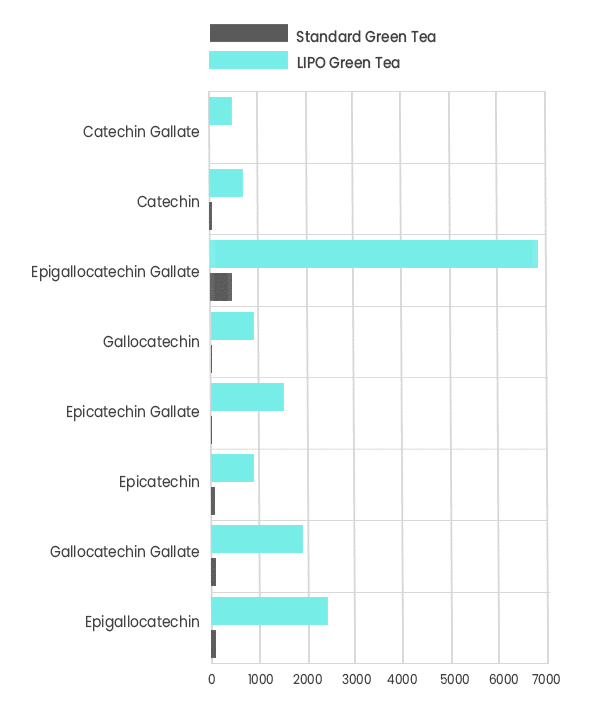


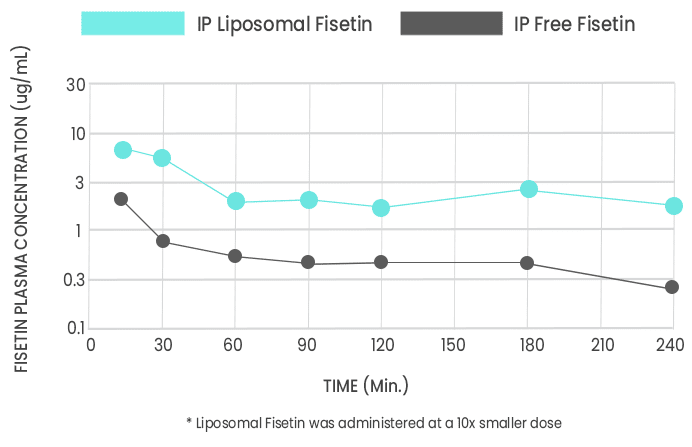


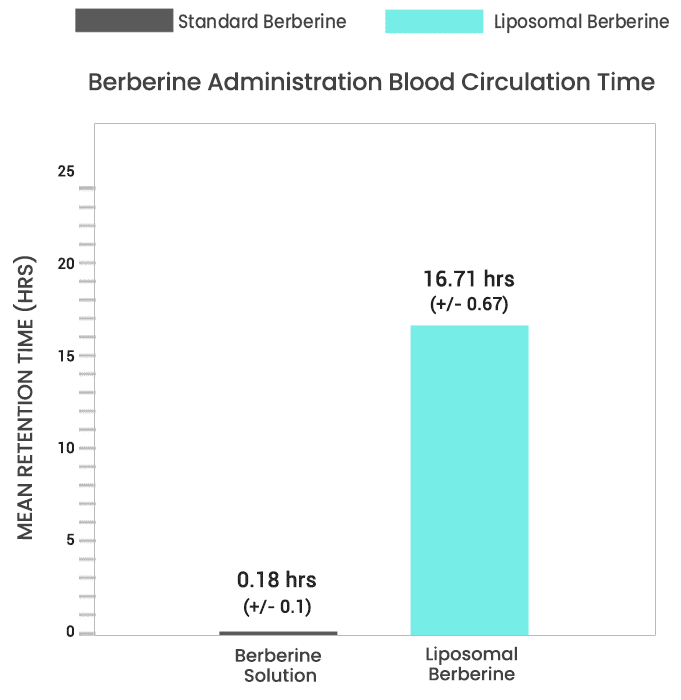


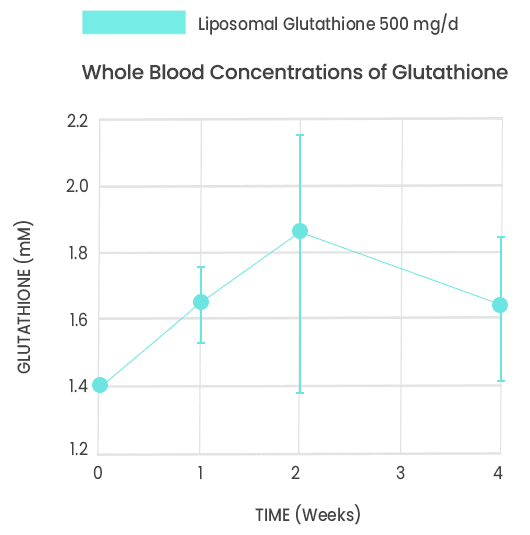

RESEARCH ON LIPOSOMES FOR INCREASED BIOAVAILABILITY
With our Liposomal products, approximately 90% of the payload reaches the bloodstream intact, regardless of what the payload is.
For example, with our Liposomal Green Tea Extract around 90% of the EGCG reaches the bloodstream.
With regular Green Tea extract, around 9% of EGCG reaches the bloodstream.
Hence the study below shows it is about 10x more bioavailable.
Regular Apigenin is around 30% bioavailable, so you can expect our Liposomal Apigenin to be approximately 3x more bioavailable than regular Apigenin.
Although we don't have research on bioavailability of all our Liposomal products, below we show research that demonstrates increased bioavailability of 3 to 40x when using liposomes in some of the most popular supplements we produce.
Liposomal Green Tea Extract 10x More Bioavailable
(This is the product we use in our Lipo Green Tea)
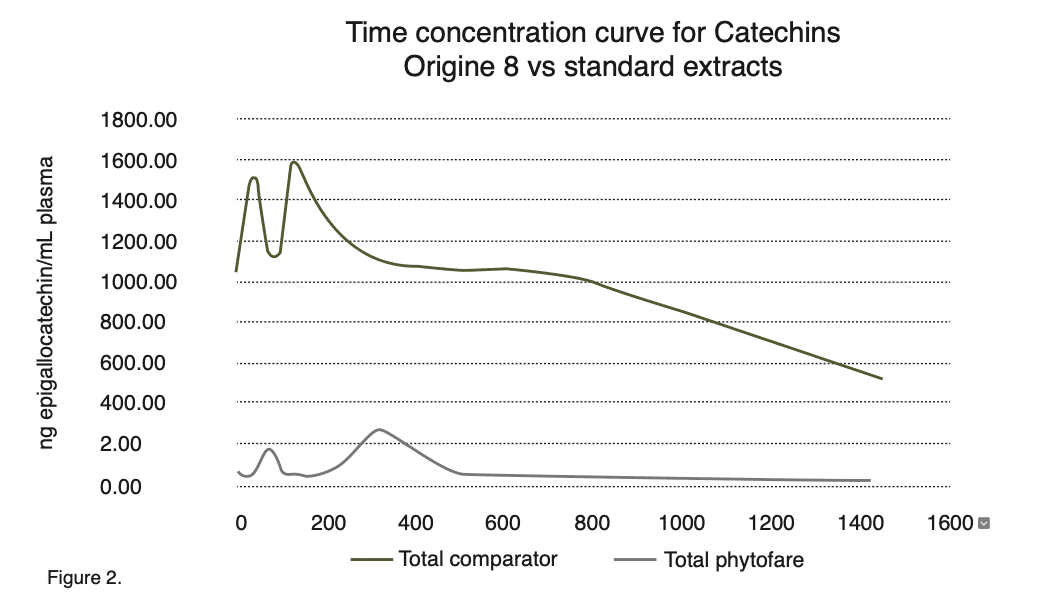
A study was conducted at the North-West University in South Africa, assessing the bioavailability of the green tea extract used in the production of Origine 8™ compared to a standard commercially available extract of green tea commonly found in green tea supplements.
Origine 8™ delivered an average concentration of catechins of 11,630 ng/ml compared to a concentration of 930 ng/ml delivered by the standard green tea extract. A 12 fold greater average concentration was delivered by Origine 8™.
Liposomal Fisetin 1.6 to 27x More Bioavailable
This study in mice found a 2.7-fold increase (in Cmax) with Liposomal Fisetin, with a dose 10 times lower than that of the free fisetin when given by IP. With IV, the Cmax of liposomal fisetin was 10, vs 6 for free fisetin.Liposomal Vitamin B-12 Formulas 3-5x More Bioavailable Than Tablet.
Route and Type of Formulation Administered Influences the Absorption and Disposition of Vitamin B12 Levels in Serum
This study compared five formulations for bioavailabilty in humans over 6 hours.A standard table (iii) was compared against an emulsion (ii), a chewabletablet (iv), an oral spray comprised of larger liposomes (v) and an oral spray comprised of very small (20 nanometer) liposomes.
- (i) Nanocelle 1000ug -28% - A nano liposomal formulation of B12 sublingual spray with an average particle size of about 20 nm
- (ii) Emulsion 1000ug - 10% -An emulsion formulation of B12 sublingual
- (iii) Tablet 1000ug - 5% - A standard tablet formulation of B12 that is absorbed through the gastrointestinal tract.
- (iv) Chewable 5000ug - 27% - A dissolvabletablet of B12 that is absorbed through the sublingual mucosa
- (v) Liposome 1000ug - 14% - A liposome oral spray of B12 with particle sizes of approximately 100 nm.
Liposomal Berberine Increases Circulation Time 23-46x
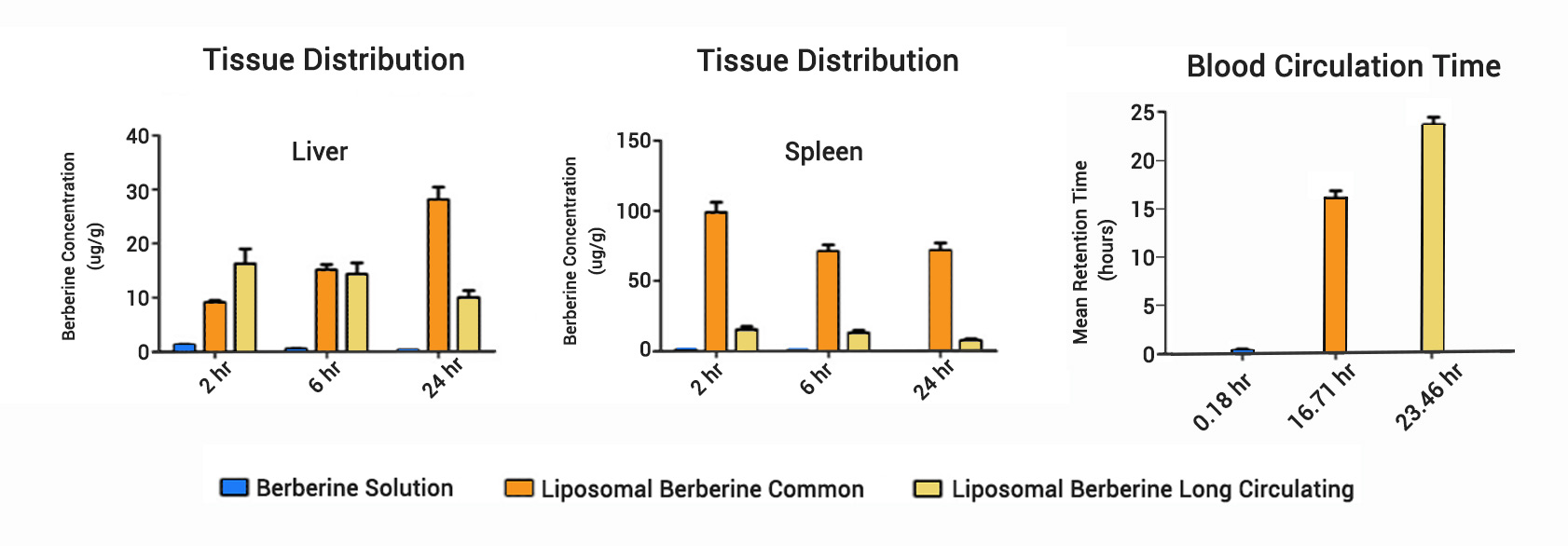 Preparation, Pharmacokinetics and Tumour-Suppressive Activity of Berberine Liposomes (Zheng, 2017)
Administration of standard Liposomal Berberine increased retention time in circulation from .42 to 10 hours. Use of PEG modified Liposomes further increased retention to to 14 hours.
Administration of Berberine solution injection is hindered by unsatisfactory pharmacokinetics and, more importantly, the risk of lethal cardiovascular adverse reactions due to rapid uptake into heart and lung. This study validated common and long-circulating liposomes as safe and effective method for sustained release of Berberine.
Read more
Preparation, Pharmacokinetics and Tumour-Suppressive Activity of Berberine Liposomes (Zheng, 2017)
Administration of standard Liposomal Berberine increased retention time in circulation from .42 to 10 hours. Use of PEG modified Liposomes further increased retention to to 14 hours.
Administration of Berberine solution injection is hindered by unsatisfactory pharmacokinetics and, more importantly, the risk of lethal cardiovascular adverse reactions due to rapid uptake into heart and lung. This study validated common and long-circulating liposomes as safe and effective method for sustained release of Berberine.
Read more
Liposomal Curcumin & Resveratrol Capsules 10-20x More Bioavailable in Circulation and Prostate Tissue vs Standard Capsules
Liposome encapsulation of curcumin and resveratrol in combination reduces prostate incidence in PTEN knockout mice. Liposome capsules of resveratrol and curcumin may inhibit prostate problems by increasing their bioavailability synergistically. In this study, we determined the bioavailability of liposome encapsulated curcumin and resveratrol, individually and in combination and evaluated the inhibitory effects of these agents against prostate growth and progression.
Serum and prostate tissue samples harvested at different time points of 30 min to 12 hr with plain liposome (0.1%), curcumin (50 mg/kg/bw), lipo-curcumin (50 mg/kg/bw), lipo-resveratrol (50 mg/kg/bw) and lipo-curcumin administered with lipo-resveratrol (25 mg/kg/bw for each).


Liposomal Glutathione More Effective
Clinical research aiming to improve glutathione concentration requires sufficient glutathione absorption and delivery.Researchers turn to liposomal glutathione to achieve sustained bioavailability. Results from two recent studies showed that liposomal nanoformulation absorption is more effective for raising blood glutathione levels in humans than non-liposomal glutathione. 1 Both studies report a very rapid decline in bioavailability of non-liposome-encapsulated glutathione compared to liposomal glutathione.Liposome Encapsulated Glutathione Elevates Body Stores
The results of a recent study demonstrated increased body stores of Glutathione (GSH) after oral administration of Liposomal GSH humans. 2 Since GSH is subject to destruction in the acid environment of the stomach, researchers tested that oral liposomal GSH might be an effective means of GSH delivery in vivo.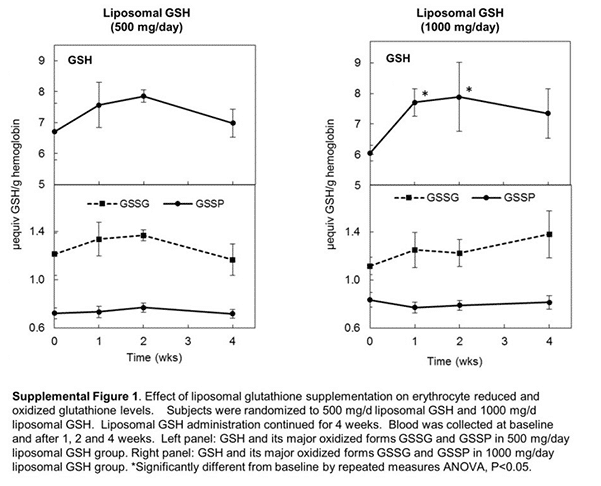 In addition, liposomal GSH had positive effects on several GSH-related parameters including decreases in biomarkers of oxidative stress and enhancements in immune functions.
In addition, liposomal GSH had positive effects on several GSH-related parameters including decreases in biomarkers of oxidative stress and enhancements in immune functions.
Finally, liposomal GSH was highly tolerated and its administration was not associated with any signs of adverse effects. 3
The results from this study provide support for the potential use of oral liposomal Glutathione as an intervention strategy for enhancing tissue Glutathione levels for use in disease therapy or prevention. Liposomal Glutathione effects were often greater that previously observed for non-liposomal Glutathione . 4 Read MoreEnhanced Efficacy of Apigenin Liposomes
A recent study focusing on establishing apigenin as a potential chemotherapeutic agent for alleviating colorectal cancer reports the development of a stable liposomal nanocarrier with high encapsulation of the hydrophobic flavone apigenin for enhanced chemotherapeutic effects.
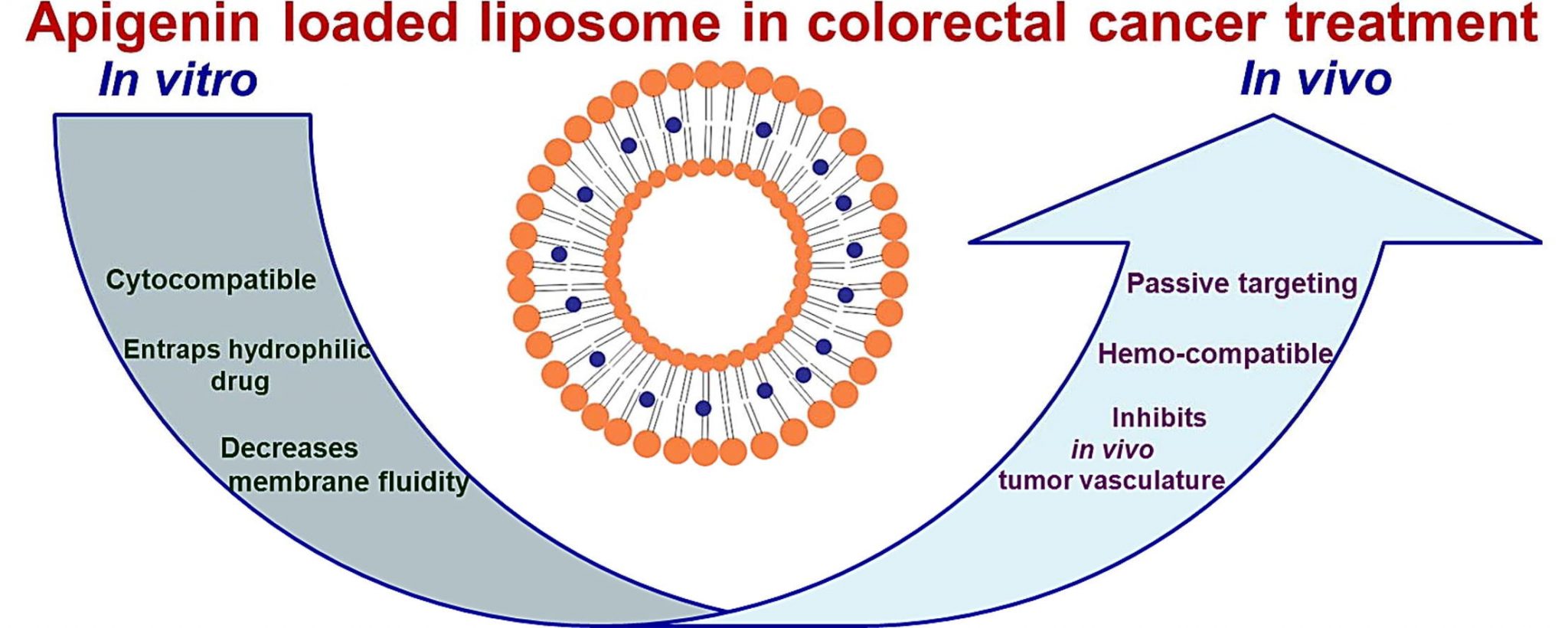 Research demonstrates the chemo-preventive properties of apigenin against colorectal cancer and the enhanced efficacy of its liposomal formulation both at the in vitro and in vivo level.
Research demonstrates the chemo-preventive properties of apigenin against colorectal cancer and the enhanced efficacy of its liposomal formulation both at the in vitro and in vivo level.
"Apigenin liposomes bypass the hurdles posed by apigenin as a chemotherapeutic due to its high hydrophobicity. The enhanced pharmacological activity of apigenin has been assigned to its ability to interact and subsequently influence membrane properties which also resulted in optimal yield of a stable, rigidified, non-leaky nano-carrier with ideal release kinetics."
 Research demonstrates the chemo-preventive properties of apigenin against colorectal cancer and the enhanced efficacy of its liposomal formulation both at the in vitro and in vivo level.
Research demonstrates the chemo-preventive properties of apigenin against colorectal cancer and the enhanced efficacy of its liposomal formulation both at the in vitro and in vivo level.
Liposomal Quercetin: Prolonged Circulation Time in Vivo
New research using Quercetin liposomes demonstrates higher quercetin concentrations in plasma than non-encapsulated quercetin and prolonged circulations time in the blood.
"The effect of quercetin liposomes was stronger than quercetin alone. This formulation provides characteristics such as high drug encapsulation ratio, low in vitro release rate and slow drug clearance and prolonged circulation time in vivo. This provides an alternative solubilization vehicle for administration of quercetin."
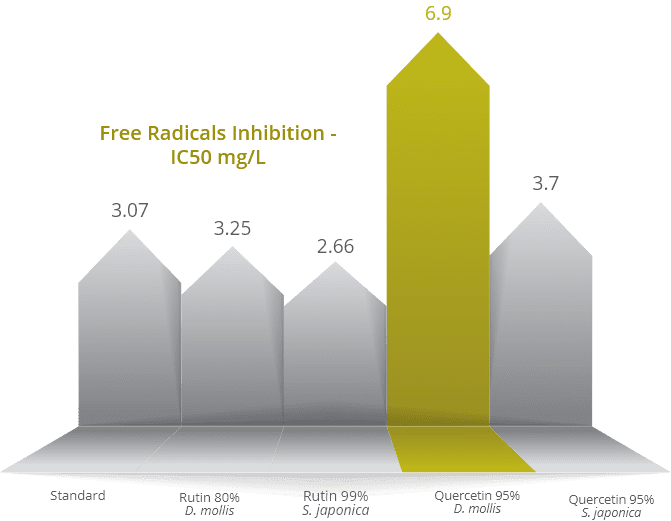
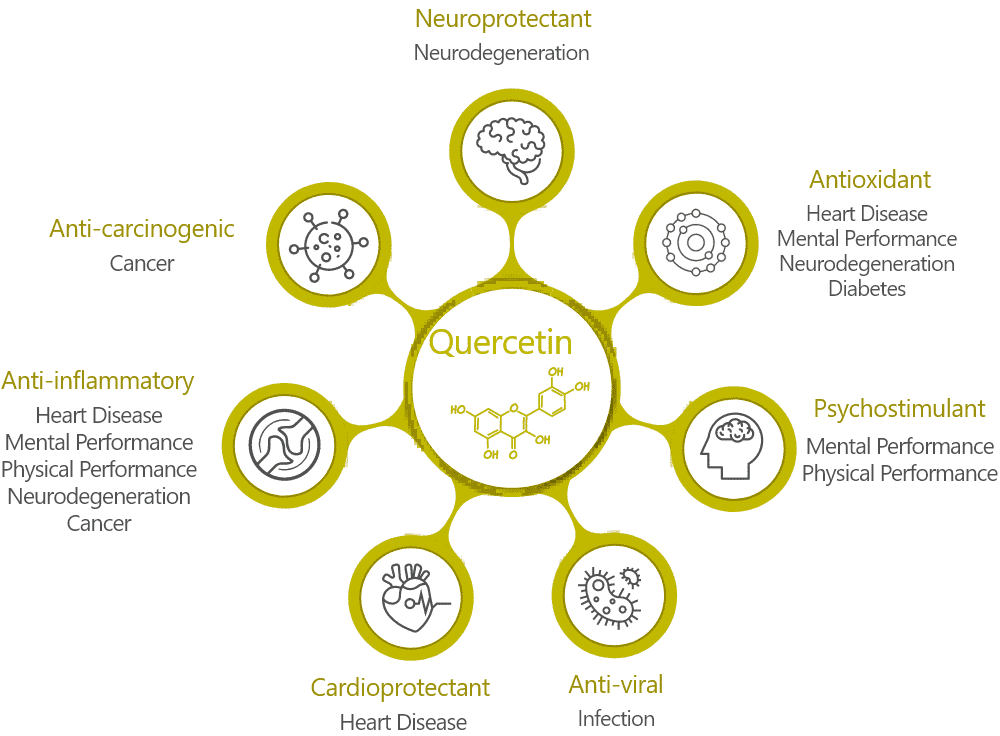
Liposomal Nanoparticles Improve the Solubility and Bioavailability of Quercetin in Liver
Liposomal nanoparticles may improve the solubility and bioavailability of quercetin in liver. A 2020 study on the protective and therapeutic effects of nanoliposomal quercetin found liposomal quercetin could effectively protect rats against acute liver injury and may be a new hepatoprotective and therapeutic agent for patients with liver diseases.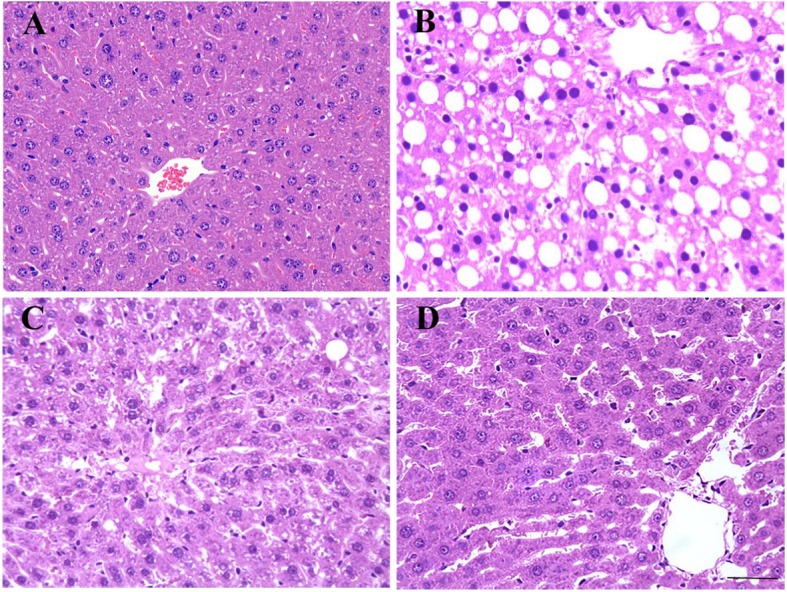
"Interestingly, nanoliposomal quercetin was more effective on decreasing liver index and interstitial inflammatory infiltration of hepatic-injured rats than pure quercetin, which indicated that the protective effect of nanoliposomal quercetin in the injured liver was stronger than that of pure quercetin."
